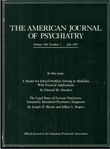Clinical research: a key to clinical training
Abstract
Rational clinical decision making is at the core of any medical field, including psychiatry. Although clinical decision making should be based on reasoning logically from sufficient hard data, the process is often short-circuited; hypotheses are considered fact or causality is inferred where only association exists. This report describes how clinical research protocols provide a structure that helps train clinicians to reduce these errors. A good research design forces articulation and evaluation of hypotheses and prevents premature assumption of causality. The authors present case examples which show that clinical research can serve as in-service training for staff clinicians.
Access content
To read the fulltext, please use one of the options below to sign in or purchase access.- Personal login
- Institutional Login
- Sign in via OpenAthens
- Register for access
-
Please login/register if you wish to pair your device and check access availability.
Not a subscriber?
PsychiatryOnline subscription options offer access to the DSM-5 library, books, journals, CME, and patient resources. This all-in-one virtual library provides psychiatrists and mental health professionals with key resources for diagnosis, treatment, research, and professional development.
Need more help? PsychiatryOnline Customer Service may be reached by emailing [email protected] or by calling 800-368-5777 (in the U.S.) or 703-907-7322 (outside the U.S.).



